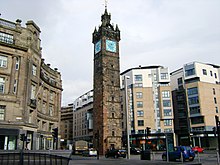Tolbooth


As Tolbooth (lat. Tolloneum ; German: Customs House ) was the central administration building of burghs in Scotland called.
history
The earliest written evidence of a Tolbooth comes from the 13th century, when a "Tolbotha" was mentioned in Berwick . As the number of burghs increased, so did the number of Tolbooths in the centuries that followed. Today, however, no medieval buildings of this type have survived. With the increasing decentralization of the administrative buildings, the Tolbooths became increasingly obsolete until the early 19th century. From then on, separate buildings were erected for the various tasks that were grouped under one roof in a Tolbooth.
description
Tolbooths often occupied prominent positions in the center of the burgh. Often they were characteristic of the cityscape due to bell towers and in small towns with low buildings they are still partly today. In some cases, Tolbooths also coexisted with town halls. They then covered the Burgh, which was partly geographically broader, while the town hall served as the city's administrative building.
Burghs generated a large part of their income from the fees and duties of their market rights . The collection of these fees was incumbent on the Tolbooth officials, which is why the buildings were often in close proximity to the market square or harbor. In addition to the offices for tax collection and the handling of general administrative tasks, courts and prisons were also accommodated in later Tolbooths, or these functions or buildings were expanded. Some of them also served as places of execution. A royal decree from 1597 obliged the Burghs to accept prisoners from the surrounding county in the prisons of the Tolbooths. This was usually combined with an increase in capacity. From the 17th century, the term Tolbooth came increasingly as a synonym for "prison" in use. The desire for a conceptual separation of administration and prison also contributed to the later abolition of the Tolbooths in favor of town halls.
See also
Individual evidence
- ^ A b c Michael Lynch: The Oxford Companion to Scottish History , Oxford University Press, Oxford, 2007, pp. 51–52. ISBN 0-199-23482-5
